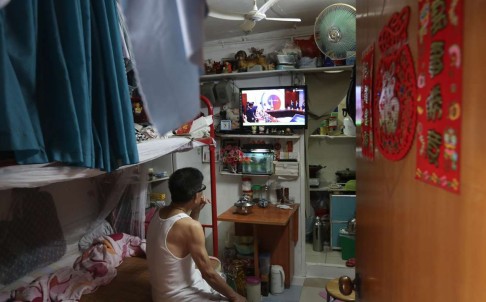There’s a long way to go before we can truly say that Hong Kong offers quality of life
Tiny homes, a huge wealth imbalance and rising poverty are signs we should look beyond economic success alone
SCMP EDITORIAL
PUBLISHED : Sunday, 30 October, 2016, 1:03am
UPDATED : Sunday, 30 October, 2016, 1:03am

The latest report by the Poverty Commission showed that despite some improvement in previous years, the number of people living below the official poverty line has surged to a six-year high at 1.34 million. Photo: Bruce Yan
The concept of quality of life varies from person to person. It could be a nice meal or an overseas vacation; clean air and green environment; affordable housing and job opportunities; a good health care system and education; freedoms and a fair and just society. While there appears to be a bit of everything of these in Hong Kong, the city does not stand out as one with good quality of life.
This has been reflected repeatedly in international and local studies. The latest one is done by a local policy think tank. According to a well-being indicator compiled by the Bauhinia Foundation Research Centre, our quality of life index only rose 0.4 per cent between 2000 and 2015. The index collated scores in 11 areas, including income, housing, jobs, health, safety, education, recreation, and environment and governance, and covered factors like property prices, public housing waiting times, transport costs as well as vehicle density.
That our quality of life has remained almost stagnant for more than a decade should not be a surprise. There is, indeed, no shortage of evidence of a decline in various aspects. The mushrooming of cubicle-like subdivided flats and the trend for developers to build shoebox residential apartments are the latest examples. While their emergence is arguably just a response to market needs, the phenomenon is nonetheless shameful in the context of our economy. Based on the methodology used by the research centre, the index measuring the city’s GDP growth rose by almost 60 per cent, compared with the 0.4 per cent rise in quality of life index during the same period. The contrast does nothing for our image as Asia’s world city.
Academics attributed the gap to our skewed economy and imbalanced growth. The dominance of finance and real estate means not everyone can benefit from the boom. This is not helped when government efforts to promote wealth redistribution still have gaps. The latest report by the Poverty Commission showed that despite some improvement in previous years, the number of people living below the official poverty line has surged to a six-year high at 1.34 million.
With one in seven living in poverty, the city can hardly boast about its quality of life. Economic success and individual well-being are not necessarily correlated. As we pursue development and growth, it is important to look beyond numbers and trends. Only when people enjoy real improvement in different aspects of life can Hong Kong become a city with a true quality of life.
沒有留言:
張貼留言